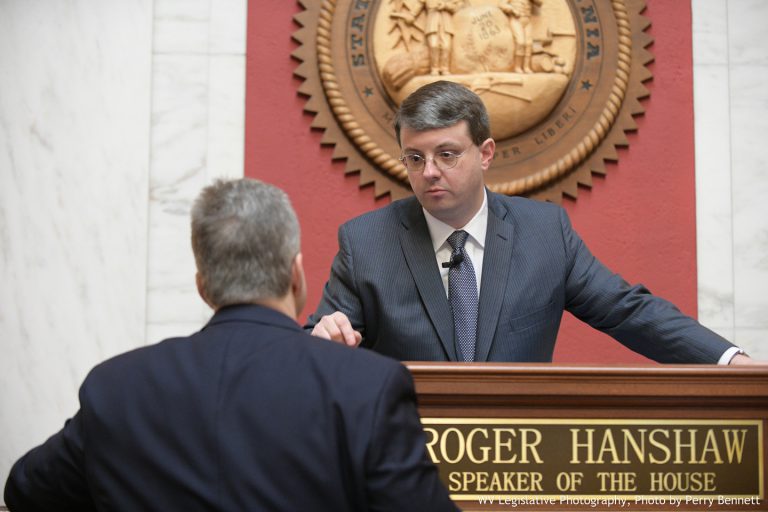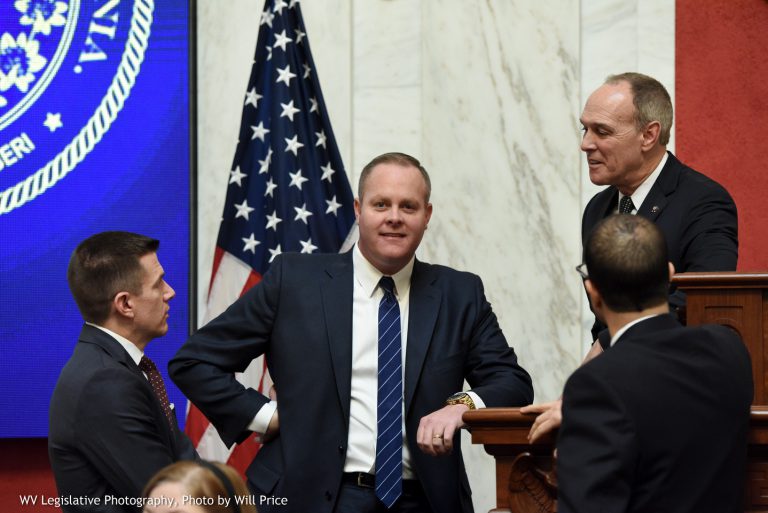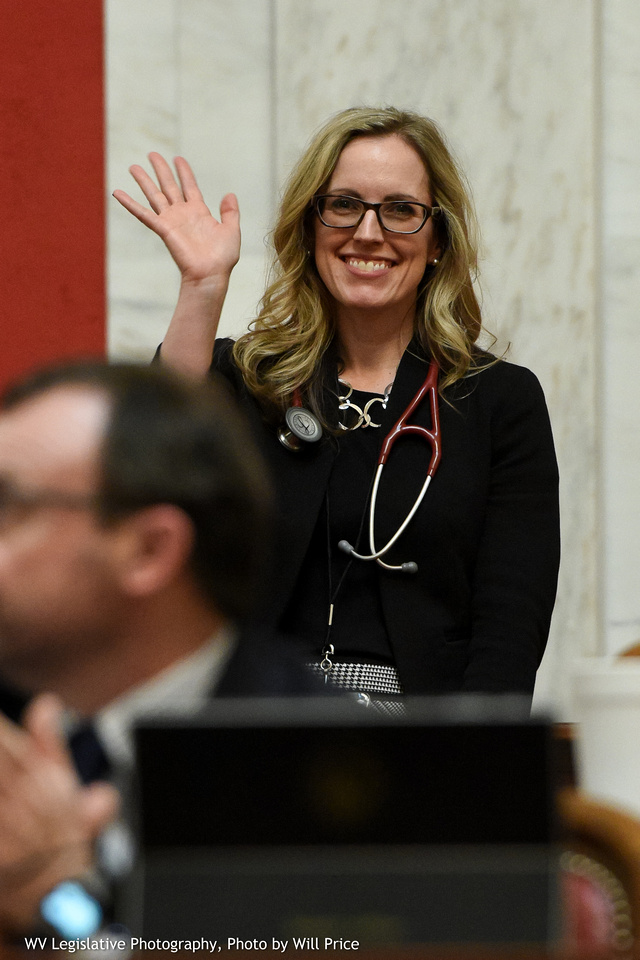As of 4 p.m. Friday, February 8, 2019, the 31st day of the first regular session of the 84th Legislature, 563 bills have been introduced to the senate. Of those bills, 78 have passed and have been sent on to the House for further consideration.
SB 16: The bill would allow the expenditure of unexpended sums and surplus funds of the Wyoming County Commission to be placed into a special fund to establish a K-9 Unit for drug searches.
SB 30: The bill would provide that for the taxable years beginning on or after January 1, 2019, the tax imposed by W.Va. Code §33-3-15 is discontinued. That section requires every life insurer transacting insurance in West Virginia to report annually to the Insurance Commissioner the gross amount of annuity considerations collected and received by it during the previous calendar year on its annuity business transacted in this state. Such amount is then taxed 1% of the gross amount of the annuity considerations, less annuity considerations returned and less termination allowances on group annuity contracts.
SB 90: The bill would do the following:
- Transfer the Safety Treatment Program, which treats and educates people whose licenses were revoked due to concerns of alcohol and/or drug use while operating a motor vehicle, from the DHHR to the DMV
- Require also that the money from the DHHR Safety and Treatment Fund be transferred to the DMV Treatment Fund
- Create a new subsection that would require the DMV to create grievance and appellate procedures by promulgation of rules that allows participants to appeal to the regular courts of the state after they have exhausted administrative remedies
SB 100: The bill would modify the fee added to court costs in criminal actions, excluding municipal parking ordinances and to the amount of any case or property bond posted for a violation of criminal law. The current fee is $2. This bill would change that to $12.
SB 127: The bill would add to the duties of probation officers that of drug and alcohol testing of family court litigants.
SB 154: The bill would require county boards of education to allow school facilities to be used for the funeral or memorial service of a community member of distinction who was a military service member, veteran or who served as a first responder. Additionally, the bill would prohibit a funeral or memorial service held at a school facility from disrupting classroom instruction, other scheduled school event, or other official governmental use such as when a school serves as a polling place for an election.
SB 157: The proposed amendments would allow a vendor’s contract to be cancelled if it was awarded in error, allow related parties to a debarred vendor to also be debarred, authorize the Purchasing Division to recalculate a vendor’s extension price provide for reciprocal preference in limited circumstances and providing requirements to claim the preference, allow for best-in-class solutions in evaluating requests for proposals and allow for standardization of commodities.
SB 163: Is a rules bundle which includes eight other rules all relating to the West Virginia Department of Environmental Protection (DPEP). The bill would modify an existing DEP rule which establishes a program of national emission standards for hazardous air pollutants as promulgated by the United States Environmental Protection Agency (EPA) pursuant to the Clean Air Act (CAA).
SB 175: The substantive changes to the rule add hospital emergency rooms and departments to the list of mandatory reporters. Secondly, the reporting requirements were expanded to include reports on not only suspected overdoses but reported or confirmed overdoses.
SB 237: The bill would require law-enforcement agencies with jurisdiction to accept a missing person complaint, and specifies the minimum information that law-enforcement agencies must attempt to collect from a complainant. It would require law-enforcement agencies receiving a missing person complaint to ensure that a report of the complaint and relevant information is entered into the state-level West Virginia Automated Police Network and when applicable, several other national databases, including those maintained by the Federal Bureau of Investigation.
The bill also prohibits a law-enforcement agency from delaying a missing person investigation pursuant to a written or unwritten policy requiring that a certain time period pass from receipt of a complaint or the date on which the person was last seen before an investigation may commence.
SB 256: The purpose of this bill would be to allow certain deductions to be made from individual personal income tax refunds for purposes of providing nursing home and health care for veterans in the West Virginia Veterans Home and for purposes of operating and maintaining the Donel C. Kinnard Memorial State Veterans Cemetery.
SB 263: The bill would limit the amount of pay which a member of the legislature may receive following the regular session of the Legislature when a state budget has not been passed. It also clarifies that a member is entitled to receive no more than five days of compensation for any extended or extraordinary session if a budget has not been passed.
SB 267: The bill would require the State Board to adopt a policy detailing the appropriate level of computer science instruction available to students at each programmatic level and requires the Department of Education to develop and offer professional development opportunities. The bill would also authorize the Department to partner with high-quality computer science professional learning providers in developing the professional development opportunities.
SB 323: The bill would establish a special revenue fund for capital improvements to Department of Agriculture’s facilities. The fund is named the “Capital Improvements Fund — Department of Agriculture Facilities.” The bill also requires that money in the fund be used exclusively by the Commissioner of Agriculture to fund construction and capital improvements to facilities owned or occupied by the Department of Agriculture.
SB 324: The purpose the bill would be to allow the Commissioner of the Department of Agriculture to hire a general counsel and other support staff as needed in order to carry out his or her duties.
SB 343: This would an agency-approved bill coming from the Division of Real Estate. The bill would require that a state agency delegated authority to enter into lease agreements first consult for advice and ultimate approval of the executive director of the Division of Real Estate, as well as any lease arrangements between an agency and other nongovernmental entities must be in the “best interest of the state.”
SB 346: The purpose of this bill would be to equalize the reimbursement rate that justices of the Supreme Court and Circuit Court judges receive for business travel while using a personal vehicle to make it identical to the rate which other state employees receive.
SB 357: The bill would repeal the sections of state code that established the Division of Justice and Community Services, amends the sections of state code relating to the Division of Administrative Services to transfer the administrative duties and employees of the Division of Justice and Community Services to the Division of Administrative Services and transfers the duties and obligations formerly within the responsibility of the Division of Justice and Community Services to the Division of Administrative Services.
SB 358: The bill would provide the Division of Protective Services of the Department of Military Affairs and Public Safety (DMAPS) an exemption from the requirement to purchase goods through the Purchasing Division of the Department of Administration. The exemption would apply to “equipment necessary to maintain security at the Capitol Complex and other state facilities” as may be determined by the Secretary of DMAPS.
SB 361: The bill would authorize Public Defender Services to establish a division to represent persons in habeas corpus matters. The bill would also allow for public defenders to decline appointments based on conflict of interest or excessive caseloads, and bill authorizes the employment of attorneys and support personnel to staff the office.
SB 369: The bill would add definitions for the terms “covered entity” and “covered individual”. If a pharmacist substitutes a drug pursuant to the provisions of this section, the patient shall receive the savings which shall be equal to the difference in the patient’s acquisition cost of the product prescribed and the acquisition cost of the substituted product. This provision may not apply if the patient is a covered individual.
SB 373: The bill would allow the Division of Corrections to withhold monies received by inmates from court judgments and civil settlements even if the awarding court fails to deduct the monies from an initial award.
SB 377: The West Virginia Code currently contains numerous exceptions to the definition of “employee” for the purposes of minimum wage and maximum hours laws. The bill would exclude any seasonal employee of an amusement park from the definition of “employee.”
SB 387: The bill would repeal code which deals with extradition for purposes of moving current law to a new article in Chapter 62 for purposes of clarity, adds a new article which incorporates language from sections repealed, adds language which clarifies that persons in other states who are improperly released from custody before completion of a sentence and subject to extradition and updates titles of persons and entities in the process.
SB 389: The bill would amend and reenacts a section of state code relating to the lawful method for a developmentally disabled person to purchase a base hunting license. It would allow for a developmentally disabled person to obtain a base hunting license when accompanied and directly supervised by a person 18 years of age or older.
SB 392: Adds a new section to state code that allows the Division of Corrections and Rehabilitation to pay contract claims that are not otherwise provided for. The division audits the payment claim, and if the claim is determined to be valid, payment is processed through the State Auditor and the Treasurer. The bill also authorizes payment of unaudited payment where the claim has been reviewed by the division and found to be fair, equitable, and to the advantage of the division, and all parties have agreed to a settlement of the claim.
SB 398: The bill would limit the per diem rate of compensation for senior status justices and judges to $430 per day and provides that a senior status judge or justice may not receive a combined total of retirement benefits and per diem compensation in a calendar year that exceeds the annual salary of a sitting circuit judge. The bill also allows senior status justices and judges to receive reimbursement for actual expenses incurred in performance of their duties. The bill also requires the State Treasurer, as custodian of state funds, to petition the Supreme Court of Appeals for a writ of prohibition prohibiting the State Auditor from issuing any warrants for the payment of a senior status judge or justice in excess of the compensation limitations in the bill.
SB 399: The bill would amend code to limit the per diem rate of compensation for senior status magistrates to $200 per day and provides that a senior status magistrate may not receive a combined total of retirement benefits and per diem compensation in a calendar year that exceeds the annual salary of a sitting magistrate.
SB 451: Multipurpose comprehensive education reform bill which:
- Amends the definitions of “employee” and “employer” within the PEIA statute to make coverage available to employees of public charter schools established under this bill. Additionally, it further amends the statute to provide that an employee who is eligible for coverage may use accrued sick leave toward the premium cost of insurance. For every ten days of accrued sick leave, the employee will be credited one additional month of coverage for the retiree and his or her dependents.
- Modifies levy rates for county boards of education and allows county boards to increase their regular levy rates through a majority vote of their members.
- Creates a $250 tax credit for the purchase of supplementary education materials or professional development costs incurred by a classroom teacher employed by a public or private school.
- New language which states that county boards may establish an open enrollment policy without charging tuition and without obtaining approval from the county board. The policies are to identify admission criteria, application procedures, transportation provisions, timelines for open enrollment periods, and restrictions on transfers due to building capacity constraints. The new language sets out instances in which the county board may give enrollment preference and requires the county to comply with all enrollment requirements for children who are in foster care or who meet the definition of unaccompanied youth. An appeal process is created through the state board of education. The provision also allows for the potential that a transferred student could choose to return to a school in his or her county of residence after the second month of any school year.
- The state superintendent is authorized to permit more than 28 pupils per teacher in a classroom for grades 4-6 for the purpose of physical education. 28 pupils per teacher in grades 1-6 in the event of extraordinary circumstances and upon application by a county board.
- Explains that school counselors’ main responsibility shall be providing direct counseling services to students.
- Removes language related to tenure and clarifies that central office administrators, supervisors, and directors, hired after July 1, 2020, shall serve at the will of the superintendent and may be removed upon approval of the county board.
- Adds a new section that modifies the school calendar and states that the code defines the school term both for employees and for instruction. The new language states that the use of equivalent time gained to cancel days lost and the use of alternative methods to deliver instruction on canceled days are considered instructional days for meeting the 200-day minimum employment term and the 180-day minimum separate instructional day requirements. It further clarifies that when a concerted work stoppage, or strike, by the employees assigned to a school causes the county to close the school, the county board shall withhold the pay of the employees for each day the school is closed. The withheld pay shall be paid by the county to employees who subsequently fulfill their assigned duties for the instructional term and the employment term as per their employment contract.
- Adds a provision which states that the teacher’s recommendation relating to a student’s promotion to the next grade shall be a primary consideration.
- Authorizes the establishment of public charter schools and defines terms, including: “authorizer,” “public charter school” and “teaching member.” This section lays out basic instruction for the implementation of public charter schools within a community.
- Requires that the attendance director or administrators shall make contact with the parent, guardian or custodian of a student to ascertain the reasons for unexcused absences and what measures the school may employ to assist the student in attending.
- Adds language to the definition of “professional student support personnel” to include social workers and psychologists.
- States that for the 2019-2020 fiscal year and after, the basic foundation allowance for professional student support personnel is the amount of money required to pay the state minimum salaries subject to certain criteria. The bill also amends the percentage of each county’s allowance for current expenses from 70.25% to 71.25% of the county’s state average costs per square footage per student for operations and maintenance amount.
- Bill amends the powers and duties of the state superintendent concerning exceptional children, adds language that a separate appropriation shall be made to the department of education and be disbursed to county boards and public charter schools when assisting with serving exceptional children.
- Creates the Education Savings Account Act, or the ESA Act. An ESA is an education saving account to which funds are allocated by the Treasurer to the parent or parents of an ESA student in order the pay qualifying education expenses to educate the student.
- The bill increases the 2019-2020 salaries for teachers and school service personnel. The increase for teachers is $2,120 annually, and for school service personnel the increase is approximately $115 per month. Effective July 1, 2020.
- New language gives counties the discretion and flexibility to use local county funds, not otherwise factored into the public-school support program, to provide the best education to their students, including by providing salary supplements to teachers.
- Allows county boards of education to base its employment decisions on an employee’s qualifications as defined in county board policy.
- Requires county boards to provide annual notice of insurance coverage to school employees, with notice being sent via email or first-class mail.
- Requires personal leave to be accrued at the end of each pay period based on a ten month pay calendar or on the last workday for separating employees.
- Modifies the Underwood-Smith Teaching scholars Program.
SB 453: This bill would amend and reenact West Virginia code relating to background checks of certain financial institutions by the Division of Financial Institutions, formerly known as the Division of Banking. This section sets forth the duties and powers of the Commissioner, which includes in current law the mandatory duty to require a criminal background investigation. The bill amends current code to provide that the Commissioner may determine alternate acceptable forms for background check information for direct or indirect principals of a licensee or applicant for a mortgage lender or broker license or a money transmission license who are not residents of the United States. The bill also updates the term “Division of Banking” to the “Division of Financial Institutions.”




